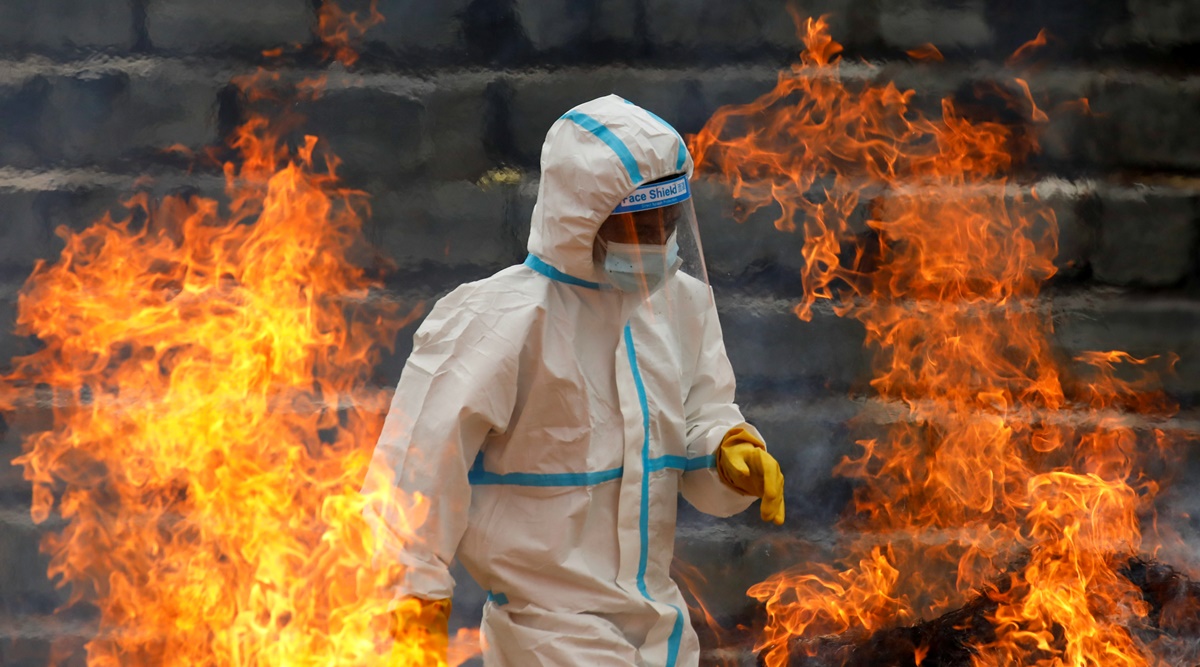Updated: May 10, 2021 6:57:41 pm
 As a generation, we have lived through riots and recessions, religious places being torn down and others being built, but perhaps nothing will come close to this life-defining moment.(Representative image: Reuters)
As a generation, we have lived through riots and recessions, religious places being torn down and others being built, but perhaps nothing will come close to this life-defining moment.(Representative image: Reuters) “She listened to Main Zindagi Ka Saath Nibhata Chala Gaya till she was at home. It was more than a song; it was her philosophy.” His voice breaks as he talks, capturing the last few moments of peace and normalcy before the Covid-19 hurricane hit their family of two, taking away his wife.
A Bollywood buff if there was one, she used to speak in film dialogue and scenes despite having a prosaic profession, the sort that comes to you after an MBA from one of India’s top colleges. It is heartbreaking and poetic that the end came with the Sahir Ludhianvi song.
These stories are becoming achingly familiar as India seems to be gasping for breath, each more devastating than the one before. A population of 1.3 billion is trying to make sense of how it could have gone so wrong. Just when we were putting together the pieces, wondering whether life will indeed return to normal on the back of a countrywide vaccination drive and a pandemic that appeared to be retreating, or so we were told, it quietly entered our homes, and showed us just how unprepared we were.
Nowhere is the class divide more apparent in India than in healthcare. While “they” went to government hospitals staffed with overworked doctors and inadequate resources, “we” paid through our noses for private hospitals. The cost may be draining, but it was about health, no? The devastating second wave of the pandemic proved that the faith was misplaced. We do not need data to show just how brutal the pandemic has been, we all have anecdotal evidence.
The neighbour who didn’t have time to grieve for his father because he was desperately trying to get an ICU room for his critical mother, the friend you had promised to meet after “all this was over” who died waiting for oxygen, and the acquaintance you had not spoken for years who frantically called you late at night, asking if you can help with remdesivir. All of them desperate, vulnerable and close to their breaking point. And, yet, incredulous about how close they are to losing their loved ones because they can’t find a can of oxygen or a hospital bed. “There must be some way, there has to be. How can this be?” a friend says out loud, more to himself than me as he looks for life-saving drugs. He isn’t looking for support or affirmation of hope, we are all past that.
As a generation, we have lived through riots and recessions, religious places being torn down and others being built, but perhaps nothing will come close to this life-defining moment. As an entertainment journalist, you get used to the social media diatribe, and the put-downs from your colleagues, “You think this is news?” However, just like in the velvet darkness of theatres where we find our escape, our catharsis, our break from the incessant monotony that is life, so is the reportage of the larger-than-life world that is cinema.
It was the black-and-white world of Guru Dutt and Dev Anand that my parents found succour in while keeping tabs on their oxygen and medicines as worry nibbled away at them, an uncle who battled anxiety and the coronavirus by watching documentaries on cricket — “cinema and cricket, my twin loves,” he joked, and friends who relied on IPL to give them a break from the exigencies of quarantine.
Just as 2020 proved that you can’t find heroes in your entertainers because that is how civilisations die, 2021 has established the need for escape in the darkest of times — a moment of relief when life and death become too much. For so many, it came with songs we have grown up to, films that are like a loved one’s warm hug. But we need cinema for the times that we are living in, cinema that captures our tragedy, our anger, our agony. Let us be the heroes of our stories, because we have realised there is nobody out there who is going to save us, it is just us and our need to do the right thing. Let us write a new script for a new era, and never forget because we have reached the place that Sahir spoke of – gham aur khushi mein fark na mahsoos ho jahan. It is time to write our own story.
- The Indian Express website has been rated GREEN for its credibility and trustworthiness by Newsguard, a global service that rates news sources for their journalistic standards.

